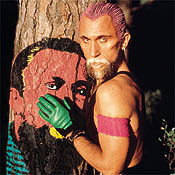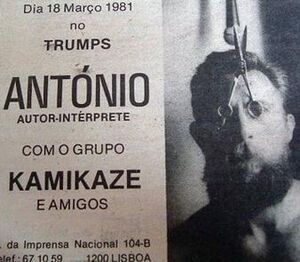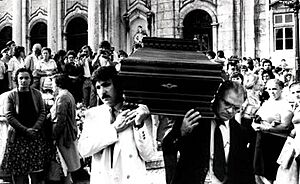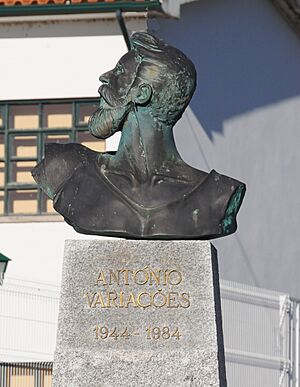António Variações facts for kids
Quick facts for kids
António Variações
|
|
|---|---|

Variações in 1982.
|
|
| Background information | |
| Birth name | António Joaquim Rodrigues Ribeiro |
| Born | 3 December 1944 Amares, Portugal |
| Died | 13 June 1984 (aged 39) Lisbon, Portugal |
| Genres | Pop, folk, new wave |
| Occupation(s) | Singer, Songwriter |
| Years active | 1978–1984 |
| Labels | EMI - Valentim de Carvalho |
António Joaquim Rodrigues Ribeiro (born December 3, 1944 – died June 13, 1984) was a famous Portuguese singer and songwriter. He was known by his stage name, António Variações. Even though his career was short because he passed away at 39, he became one of the most important artists in recent Portuguese history.
His music mixed modern styles with traditional Portuguese sounds. Many people see his music as a symbol of the changes that happened in Portuguese society after the Carnation Revolution in 1974. António Variações was very original and daring. This made him one of the most creative artists in Portuguese popular music history.
Contents
Early life and travels
António Variações was born in a small village called Fiscal, in Amares, Portugal. He was the fifth of ten children. As a child, he loved music more than his farm chores. He often went to local folk celebrations. He finished school at age eleven. Soon after, he started his first job making small items in a nearby village.
When he was twelve, he moved to Lisbon, the capital city, to work in an office. From 1964 to 1967, he served in the army in Angola during a war. He returned home safely. Almost right away, he left for London and worked as a dishwasher for a year.
He came back to Portugal for a short time in 1976. Then, António Variações traveled to Amsterdam. There, he started working as a hairdresser. He continued this job when he returned to Lisbon the next year. He opened the first salon in Portugal where both men and women could get their hair done. Later, he opened a barber shop downtown. Many people from the music industry were his clients. They later helped him start his music career.
At night, he also started performing in local clubs. He played with a group of musicians called "Variações," which means "Variations." This name showed the many different styles and influences in his music. His bright clothes and unique fashion choices quickly made him stand out.
Music career
Signing with a record label
In 1978, António sent a demo tape to Valentim de Carvalho. This was one of the biggest record labels in Portugal. He signed a contract, but he couldn't record anything for four years. The record company wasn't sure if his music was folk or pop. They couldn't agree on what to do with such a unique artist.
In February 1981, he appeared on a popular TV show called "Passeio dos Alegres." He performed two new songs with his band, "António e Variações." The show's host, Júlio Isidro, was a customer at António's barber shop. Júlio invited him to be on the show after António told him he wrote songs. After this, he was also a guest on a radio show called "Febre de Sábado de Manhã."
First album: "Anjo da Guarda"
In July 1982, his first single was released. This time, he used the name António Variações. The single included a cover of a famous fado song called "Povo Que Lavas No Rio." This song was made famous by the great fado singer, Amália Rodrigues. The single also had an original song by António, "Estou Além." This became one of his most famous songs.
Some people were surprised by his cover of the fado song. But over time, it was seen as a true tribute from Variações to Amália Rodrigues. He even dedicated his first full album, called "Anjo da Guarda," to her. This album was released in 1983 and was very popular. Two songs from it, "O Corpo É Que Paga" and "É P'ra Amanhã," were played often on the radio. "É P'ra Amanhã" was even released as a summer single.
Second album: "Dar & Receber"
After many concerts, António went back to the studio. From February 6 to 25, 1984, he recorded his second and last album. It was called "Dar & Receber." Most of the band Heróis do Mar helped him record it. The album was released in May of the same year. It was also very popular. The song "Canção de Engate" became one of his biggest hits.
Two months later, he performed his last concert. It was in Viatodos, Portugal, at the "Feira da Isabelinha" festival. In April, he made his last public appearance on the TV show A Festa Continua, also hosted by Júlio Isidro.
Passing away
On May 18, 1984, Variações was admitted to the Pulido Valente hospital. He had symptoms of a serious lung infection. Later, he was moved to the Red Cross Clinic. At that time, his health was very weak. Rumors about his condition started to spread. Because of these rumors, he faced some unfair treatment. Only his family and closest friends visited him in the hospital. In June, the news reported that his health had gotten much worse.
In the early morning of June 13, António Variações passed away from a severe lung infection. His funeral was held on June 15 at the Estrela Basilica. Family, friends, musicians, barbers, and fans came to say goodbye. The funeral caused some discussion because authorities ordered his coffin to be sealed. This was for public health reasons. This made the rumors about his health even stronger. His family does not agree with the rumors about the cause of his death. However, many people believe he was one of the first public figures in Portugal to pass away from a certain illness. His remains were buried in the cemetery of Fiscal, Amares, where they are today.
Musical style
António Variações did not have formal music lessons. His first music influence was his father, who played the accordion and cavaquinho. But his father never became a professional musician. From his travels abroad, Variações learned about artists and music styles that were not well-known in Portugal. He started mixing styles like pop, rock, jazz, blues, and new wave with his Portuguese folk and fado roots.
Even without knowing how to play instruments or compose music, António made his own songs. He used a tape recorder. He would make sounds and rhythms with his voice or by tapping on objects. His studio musicians then used these recordings to create the full song arrangements. Variações' music used many different instruments. These included synthesizers, Portuguese and classical guitars, and accordions.
He created his own way to describe his music: "something between Braga and New York." This showed how his style was both modern and connected to his rural Portuguese roots. He wanted to be a popular artist for everyone. He reached many different people, from workers to intellectuals, and from young to old.
Lyrics
António Variações only had a basic education. But he had a great sense of rhythm and was very good with words. His song lyrics often mixed old sayings, common wisdom, and his own experiences. He was skilled at turning everyday ideas into original and powerful images.
Because his words were so relatable, many listeners could connect with his songs. His songs often talked about feeling restless, wanting to escape, or the tricky side of love. Some of his songs were about his own life. For example, "Olhei P'ra Trás" describes leaving his small village with sadness but also hope. "Deolinda de Jesus" was a song dedicated to his mother.
|
Leave it for tomorrow Yet another day and you lived nothing |
| — This is part of the song "É p'ra Amanhã." It's about putting things off. The song uses a common Portuguese saying, "Don't leave for tomorrow what you can do today." It reminds listeners that time passes quickly. |
Influences
António Variações greatly admired the Portuguese poet Fernando Pessoa. He dedicated his album "Dar & Receber" to Pessoa. He also used one of Pessoa's poems in his song "Canção." Some of his lyrics are similar to feelings in Pessoa's poems.
Another big influence was Amália Rodrigues, a world-famous fado singer. Besides dedicating his first album to her, he also covered one of her songs. He wrote a song called "Voz-Amália-de-Nós" about her. In it, he sings, "All of us have Amália in our voice and we have in her voice the voice of all of us." Amália Rodrigues is a national hero in Portugal. The two artists met on stage only once, at a concert in Lisbon on May 26, 1983. Amália showed her respect by attending António's funeral.
From his many trips abroad, he learned about artists like David Bowie, Bryan Ferry, The Kinks, Elvis Presley, and The Beatles. Meeting these different music cultures made a big impact on him. In fact, his first songs were written in English. But he soon changed to writing in Portuguese to find his own unique style.
Collaborators
Because Variações didn't know how to properly compose music, he needed to work with other musicians. They helped him write, record, and produce his songs. For his first album, "Anjo da Guarda," he worked with Vítor Rua, Tóli César Machado (from the band GNR), and José Moz Carrapa.
For his second album, "Dar & Receber," he worked with Pedro Ayres Magalhães and Carlos Maria Trindade. They were part of the band Heróis do Mar at the time. The five members of Heróis do Mar were António's studio band. They became very close to Variações. Pedro Ayres Magalhães wrote fondly about him in the album notes for "Dar & Receber." He said, "I thank you António, for your enthusiasm and trust, and I would like to write here that I've gained a friendship."
Humanos
When António Variações passed away, he left a box with over forty tapes and studio recordings. These were forgotten for a long time. First, his brother, Jaime Ribeiro, had them. Then, David Ferreira at EMI-Valentim de Carvalho kept them for over ten years.
Later, a journalist named Nuno Galopim decided to listen to and write down the songs. This project became the start of a musical group called Humanos. They used António's unreleased music to create new songs.
Discography
Lifetime releases
- Singles
- 1982 - Povo Que Lavas No Rio/Estou Além
- 1983 - É P'ra Amanhã.../Quando Fala Um Português...
- LPs
- 1983 - Anjo da Guarda
- 1984 - Dar & Receber
Posthumous releases and remasterings
- Singles
- 1997 - Canção de Engate
- 1997 - O Corpo É Que Paga/É P'ra Amanhã... (remixed by Nuno Miguel)
- 1998 - Minha cara sem fronteiras - entre Braga e Nova Iorque
- Albums
- 1997 - O Melhor de António Variações (best-of)
- 1998 - Anjo da Guarda (third studio album, includes the bonus track Povo que lavas no rio)
- 2000 - Dar & Receber (fourth studio album, includes three versions (two of which are remixes) of Minha cara sem fronteiras)
- 2006 - A História de António Variações - entre Braga e Nova Iorque (best-of which includes previously unreleased demos)
Tributes
- Cover songs
- 1987 - Delfins - Canção de Engate
- 1995 - Amarguinhas - Estou Além
- 1995 - Íris - Estou Além
- 1996 - MDA - Dar & Receber
- 1996 - MDA - Estou Além
- 1997 - Isabel Sivestre - Deolinda de Jesus
- 2004 - Donna Maria - Estou Além
- 2004 - Funkoffandfly - Dar e receber
- 2005 - RAMP - Anjinho da Guarda
- 2008 - André Sardet - Anjinho da Guarda
- 2012 - Tiago Bettencourt - Canção de Engate
- 2013 - Dead Combo & Márcia - Visões Ficções
- 2014 - OqueStrada - Parei na Madrugada [inedit song]
- 2015 - Linda Martini - Visões-ficções
- 2016 - Telmo Pires - Ao passar por Braga abaixo [inedit song]
- 2017 - Filipe Catto - Canção de Engate
- 2017 - União das Tribos feat. Miguel Ângelo - Canção de Engate
- 2017 - The Beheaded - Canção de Engate
- 2020 - Lina e Raül Refree - Voz Amália de Nós
- 2020 - Zeca Baleiro - Canção de Engate
- Albums
- 1989 - Lena D'Água - Tu Aqui [5 inedit songs of Variações]
- 1994 - Variações - As canções de António
- 2004 - Humanos - Humanos [inedit songs of Variações]
- 2006 - Humanos - Humanos ao Vivo - [1 CD + 2 DVD, inedit songs of Variações]
- 2019 - Variações - Variações
Variações (film)
A movie about António Variações was released in August 2019 in Portugal. It is called Variações. The movie's story was written by João Maia. It was produced by David & Golias. The actor Sérgio Praia played António in the film.
See Also
 In Spanish: António Variações para niños
In Spanish: António Variações para niños
- Humanos




